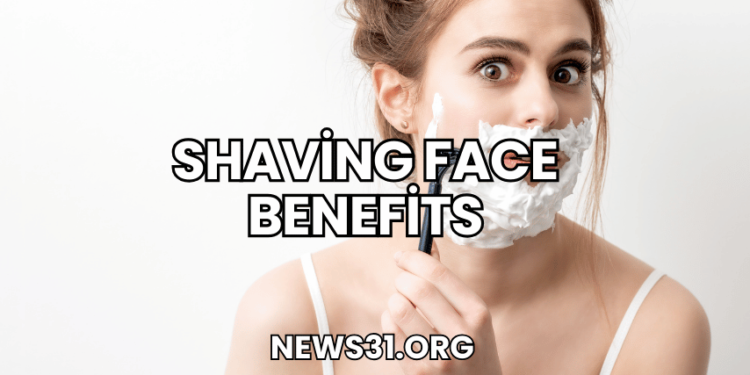Facial shaving is a grooming practice that has gained significant attention for its diverse benefits beyond just hair removal. While traditionally associated with men, shaving is now embraced by many women for its skincare advantages. In this comprehensive guide, we will delve into the numerous benefits of shaving your face and explain why it might be a valuable addition to your skincare routine.
Why Consider Shaving Your Face?
Shaving the face is more than just a grooming habit—it can also enhance your skin’s appearance and texture. This practice, often referred to as “dermaplaning” in skincare, offers multiple benefits that extend beyond a smooth, hair-free look.
By removing facial hair and dead skin cells, shaving helps create a flawless base for makeup application and boosts the skin’s natural radiance. It’s a simple yet effective way to improve your skincare game while enjoying other unexpected perks.
Exfoliation: Removing Dead Skin Cells
Shaving your face acts as an exfoliation method, removing dead skin cells and leaving the skin smooth and refreshed. This process is crucial for maintaining healthy skin.
Exfoliation is essential for unclogging pores and preventing acne breakouts. When you shave your face, you are gently scraping away the outermost layer of dead skin, promoting cell turnover. This allows your skin to absorb skincare products more effectively, maximizing their benefits.

Smoother Makeup Application
One of the most noticeable benefits of shaving your face is how it enhances makeup application. A smooth canvas ensures your makeup looks flawless and lasts longer.
Facial hair, or “peach fuzz,” can create texture on the skin that disrupts the even application of foundation, powder, or blush. By shaving, you eliminate this barrier, allowing your makeup to glide on effortlessly. The result is a professional, airbrushed finish that boosts confidence.
Reduction of Ingrown Hairs
For those who struggle with ingrown hairs, shaving can help minimize this common issue. Proper shaving techniques are key to achieving this benefit. Shaving prevents the formation of ingrown hairs by cutting the hair at the surface level, rather than letting it grow into the skin. Using a clean, sharp razor and shaving in the direction of hair growth can further reduce irritation and inflammation associated with ingrown hairs.
Improved Skin Texture and Glow
Shaving your face can significantly improve the texture and overall appearance of your skin. This benefit is especially appealing to those looking to achieve a youthful glow. The process of shaving stimulates blood circulation, which brings oxygen and nutrients to the skin’s surface. Additionally, the removal of dull, dead skin cells reveals the brighter, fresher skin underneath, giving you a natural radiance.
Enhances Skincare Product Absorption
For skincare enthusiasts, one of the best reasons to shave your face is the improved absorption of products like serums and moisturizers. When dead skin cells and facial hair are removed, skincare products can penetrate deeper into the skin. This enhances their effectiveness, allowing you to reap the full benefits of your skincare routine.
Cost-Effective Alternative to Professional Treatments
Facial shaving at home is a budget-friendly alternative to expensive professional skincare treatments, offering similar benefits without breaking the bank. Dermaplaning sessions at spas or dermatology clinics can be costly. Shaving your face at home with the right tools provides many of the same advantages, such as exfoliation and smooth skin, making it a practical option for those on a budget.

Frequently Asked Questions
Shaving your face offers numerous benefits, from smoother skin to better product absorption. By incorporating this practice into your skincare routine, you can achieve a radiant complexion without expensive treatments.
Does shaving your face make the hair grow back thicker?
No, shaving does not cause hair to grow back thicker or darker. This is a common myth. Shaving cuts hair at the surface level, and when it grows back, it may feel coarser due to the blunt tip. However, the texture and color of the hair remain unchanged.
Can shaving your face irritate sensitive skin?
Shaving can cause irritation if not done correctly, especially for those with sensitive skin. To prevent irritation, use a clean razor, apply a soothing shaving cream or gel, and shave in the direction of hair growth. Always moisturize afterward to keep the skin hydrated.
How often should you shave your face?
The frequency of shaving depends on individual preferences and hair growth. Most people find that shaving once a week or every two weeks is sufficient. Over-shaving can cause irritation, so it’s best to monitor how your skin reacts.
Is shaving safe for all skin types?
Shaving is generally safe for most skin types, but those with severe acne or active breakouts should avoid it. Shaving over acne can spread bacteria and worsen inflammation. Consult a dermatologist if you’re unsure about shaving with specific skin conditions.
What is the difference between facial shaving and dermaplaning?
Facial shaving and dermaplaning are similar but not identical. Shaving typically removes facial hair and some dead skin, while dermaplaning, performed by professionals, uses a surgical scalpel to deeply exfoliate and remove dead skin cells along with hair. Both methods improve skin texture and appearance.










